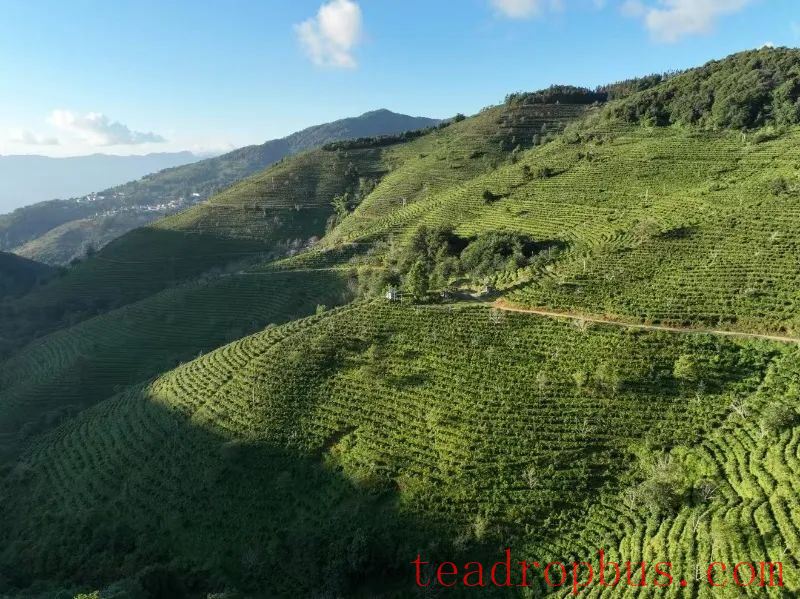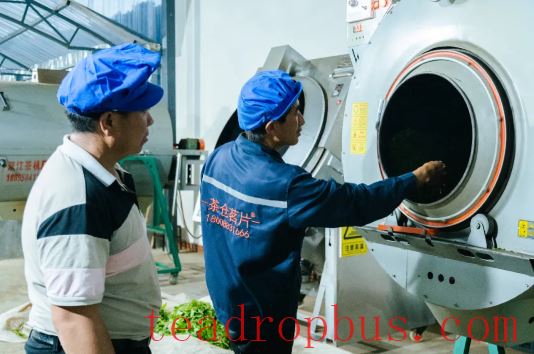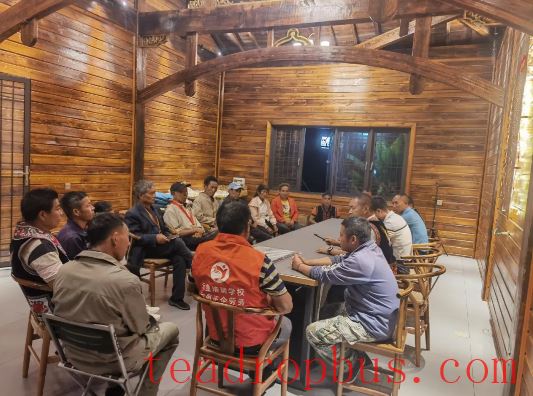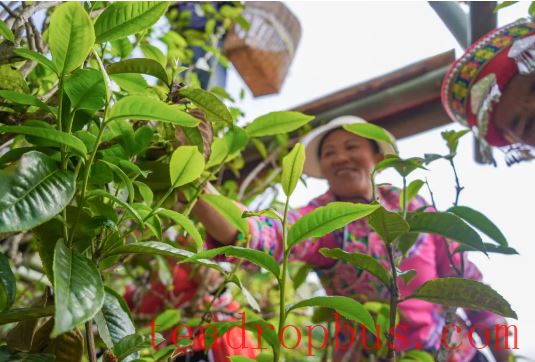In early autumn, stepping into Zhenkang County's Mangbing Township, Chaolu Village, Tea gardens and lush forests abound. Clean roads crisscross the area, while houses line the mountainside. The ancient tea gardens, saturated with green, and unique tea factories together form a beautiful green ecological economic belt. A picture of a thriving industry and prosperous village life unfolds in Chaolu Village.

Zhou Jie, 36 years old, is a resident of Chaolu Village and also a rural party member. In 2008, recommended by the village committee, Zhou Jie applied for a position as a tea processor at Mangbing Tea Factory. In the past, Zhou Jie worked outside his hometown year-round, leaving his family to manage the tea garden. This often troubled him as he couldn't take care of his family or manage his own tea garden properly. “Many villagers work at the tea factory; I've long wanted to join them…” After applying, the diligent Zhou Jie quickly passed the interview and became an employee of Mangbing Tea Factory, a position he has held for 16 years.
Mangbing Tea Factory, located in Chaolu Village, has grown from a simple Tea processing facility since 1988 to become a leading local enterprise today. Many of its employees are residents of Chaolu Village. Zhou Jie told us, “Working at the tea factory allows me to take care of my family and manage my own business. Besides my salary from the factory, I also earn additional income from our tea garden.” After starting work at the tea factory, Zhou Jie learned a lot about tea garden management. With his careful management, his family's over ten acres of tea garden now generate annual income of more than 20,000 yuan, making Zhou Jie a leader in the village's tea industry development.
According to Zhou Jin'gang, Secretary of the Party Branch of Chaolu Village in Mangbing Township, “Chaolu Village relies on modern farmer training programs to focus on planting, management, production, packaging, sales, and tea ceremony demonstrations. Using village-enterprise joint construction as a carrier, we conduct comprehensive tea chain training in the enterprise workshops and in the fields.”

In recent years, Zhenkang County has actively integrated itself into the “one corridor, one belt, one area, one path” construction of grassroots party building. Leveraging the advantages of Ma'anshan tea, it has used Chaolu Village in Mangbing Township as a pilot to explore the “non-geographic joint construction” model for party branches. This model involves constructing a cooperative framework of “party branch + cooperative + enterprise + farmers,” establishing party organizations along the tea industry chain, and through organizational collaboration and resource integration, it connects the entire industrial chain from “tea farmers to cooperatives, cooperatives to enterprises, enterprises to products, products to market, and market to brand.” Simultaneously, it establishes a two-way talent transfer channel, cultivating backbone talents in the industry chain into party members and developing party members into backbone talents and enterprise management personnel, thus activating the “talent engine” for the development of the tea industry.

“Based on the needs of the enterprise, the village frequently recommends high-quality young people to Mangbing Tea Factory and also encourages outstanding talents within the enterprise to take up positions in the village, using their wisdom and skills to lead village development. Currently, the enterprise has trained 25 technical talents for Chaolu Village, and the village party organization has cultivated one party affairs backbone for the enterprise,” said Zhou Jin'gang happily.
In April 2024, the National Geographic Marked Agricultural Products Exhibition and Experience Pavilion hosted a special event for “Geographical Indication Spring Tea” at the National Agricultural Exhibition Hall in Beijing. Recommended by China Agricultural University, the Zhenkang County Tea Association represented Zhenkang in attending the promotional activities in Beijing. Zhenkang Ma'anshan tea made its debut in Beijing. As the only tea brand from Yunnan Province, it was highly favored during the tasting and exchange session, receiving high praise and recognition for its quality.
According to Peng Guoyu, Director of the Zhenkang County Local Industry Development Service Center, “Zhenkang continues to enhance the ‘Ma'anshan Tea' brand, creating a ‘4+26' golden tea production area. Currently, the county has a total tea area of 112,200 mu, with 96.7% certified as Green Tea gardens and 56.68% organically certified. In 2025, the total output value of tea reached 1.38 billion yuan, with agricultural output reaching 380 million yuan.” Zhenkang continues to leverage its advantageous resources, focusing on the development and expansion of village collective economies, utilizing the advantages of geographical indication trademarks like Zhenkang Ma'anshan tea. Following the development strategy of “one mountain, one city, one line, one pavilion + multiple parks,” it promotes the integrated development of “tea industry, Tea culture, and tea technology,” gradually forming a “tea + culture + tourism” integrated development model.

“Zhenkang fully leverages the resource advantages of ‘Ma'anshan Tea,' creating shared courtyards at the Chun'an Tea Factory and transforming the Ma'anshan Primary School into the ‘Zhenkang Ma'anshan Tea Culture Theme Park,'” said Peng Jinguo, President of the Zhenkang Tea Association. “We are currently planning and constructing the ‘Ma'anshan Tea Culture Industrial Park' and actively expanding the functions of tea gardens by combining them with unique natural and historical-cultural resources of various regions, integrating the tea industry with tourism.”
Zhenkang County continuously innovates its party work models, explores joint development mechanisms for the tea industry, promotes joint construction along the tea industry chain, and establishes village-level collective economy organizations across the board. It has created 26 administrative villages involved in the tea industry into “standardized construction demonstration party branches” at the county level. By 2025, all 26 village-level collective economies had operating incomes exceeding 100,000 yuan.